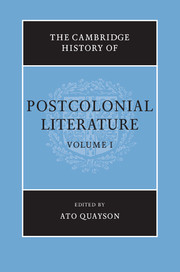Book contents
- Frontmatter
- 1 Introduction: postcolonial literature in a changing historical frame
- 2 Postcolonial fictions of slavery
- 3 Postcolonialism and travel writing
- 4 Missionary writing and postcolonialism
- 5 Postcolonial auto/biography
- 6 Orality and the genres of African postcolonial writing
- 7 Canadian literatures and the postcolonial
- 8 Postcolonialism and Caribbean literature
- 9 Postcolonialism and Arab literature
- 10 Postcolonialism and postcolonial writing in Latin America
- 11 Postcolonial writing in South Africa
- 12 Postcolonial literature in Southeast Asia
- 13 Postcolonial South Asian poetry
- 14 Postcolonial writing in India
- 15 Postcolonial writing in Australia and New Zealand
- 16 Indigenous writing in Canada, Australia and New Zealand
- 17 Postcolonial writing in Ireland
- 18 Postcolonial writing in Britain
- 19 Postcolonial writing in France
- 20 Postcolonial writing in Germany
- References
9 - Postcolonialism and Arab literature
Published online by Cambridge University Press: 28 January 2012
- Frontmatter
- 1 Introduction: postcolonial literature in a changing historical frame
- 2 Postcolonial fictions of slavery
- 3 Postcolonialism and travel writing
- 4 Missionary writing and postcolonialism
- 5 Postcolonial auto/biography
- 6 Orality and the genres of African postcolonial writing
- 7 Canadian literatures and the postcolonial
- 8 Postcolonialism and Caribbean literature
- 9 Postcolonialism and Arab literature
- 10 Postcolonialism and postcolonial writing in Latin America
- 11 Postcolonial writing in South Africa
- 12 Postcolonial literature in Southeast Asia
- 13 Postcolonial South Asian poetry
- 14 Postcolonial writing in India
- 15 Postcolonial writing in Australia and New Zealand
- 16 Indigenous writing in Canada, Australia and New Zealand
- 17 Postcolonial writing in Ireland
- 18 Postcolonial writing in Britain
- 19 Postcolonial writing in France
- 20 Postcolonial writing in Germany
- References
Summary
While there was an Arab revivalism in the last decades of the nineteenth century against both the Ottoman legacy and the colonial onslaught, the actual impact of the revivalists was limited to endeavours to combat colonial discourse and to consolidate the use of the Arabic language through educational institutions and the reprinting of classical texts like the ones edited by Shaykh Muḥsammad ‘Abdu (d. 1905). On a general and more practical level, the elite, including the military officers who were trained in Istanbul, were more receptive to a European model of a nation state with lip service to Arab culture and Islam. The absence in educational institutions – and even among writers and clerics who were dubbed as ‘religious mendicants’ by Lloyd – of a thorough engagement with the sacred in one’s culture, including religious thought, and classical or Qur’ānic rhetoric, is very conspicuous. This absence clears the ground for a counter-Europeanized outlook and undertaking manifested in the pervasive elitist reception of the European Enlightenment discourse, especially its landmarks in philosophy, sociology and education, such as Herbert Spencer’s On Education (translated in 1908), John Stuart Mill’s On Liberty, Darwin’s Origin of Species and hundreds of books in different fields of knowledge. The Turco-Albanian Egyptian ruler Muḥammad ‘Ali had already established the School of Languages, Madrasat al-alsun (1835), for this purpose. His project must not be seen as limited to Egypt, because he and, especially, his son Ibrahim worked and fought for an Arab empire with a centre in Cairo, as his conquests in Arabia and Syria demonstrate.
- Type
- Chapter
- Information
- The Cambridge History of Postcolonial Literature , pp. 250 - 287Publisher: Cambridge University PressPrint publication year: 2012



